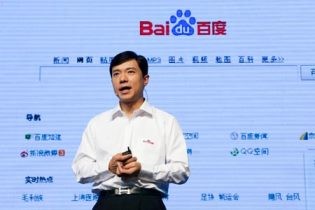Robin Li, the CEO of China’s search engine, Baidu, has called on investors to put their stake on the coming Internet boom in online-to-offline (O2O) platforms, as Li stressed that the future is not in search but in services, the Bloomberg News reported.
Li made the call during Baidu's annual conference held in Beijing last week, where he said that his top priority is the thrust on online-to-offline services, known as O2O.
"We are actually transforming the company from connecting people with information to connecting people with services," Li said in an hour-long interview after the presentation.
Li said that although advertising is big, the services and retail market is much bigger, and over time, the initiative will overshadow search revenue.
According to the report, the vision has already taken shape in some cities in China, like Beijing, where one can click an application on a smartphone and services can immediately be at hand.
But investors are reportedly skeptical as Baidu's U.S. shares dropped 37 percent this year, broadened by the slowing of the Chinese economy.
"Baidu's weak outlook couldn't have come at a worse time," Brendan Ahern, managing director of Krane Fund Advisors LLC, said. His company has shares in both Baidu and its rival, Alibaba Group Holding Ltd. "China sentiment among U.S. investors is poor."
Li added that the changes in China are not appreciated by many U.S. investors despite the fact that O2O services in China are taking off fast because of new smartphone technology, cheap labor and worse traffic. He expressed concern that because shareholders fail to see the opportunity, Baidu, which trades on NASDAQ, is being penalized.
In addition, Baidu is facing tough competition from dozens of startups that position themselves into each niche, including Alibaba and Tencent Holdings Ltd., the other two giants of China's Internet, that are investing heavily into O2O.
The report said that Li is determined to lead in what he calls "high-frequency" services like food delivery, movie tickets and car rides. Although profits are minimal or non-existent at present, he believes that it will be profitable in the future as consumers become trained.
"We need to win the high-frequency war," Li said. "It's really important for Baidu to grab the opportunity."
According to the report, Baidu has tapped its $12 billion cash capital, its 20,000-strong sales force and its pool of scientists in Beijing and Silicon Valley to develop image, voice, deep learning and high-performance computing technologies.
At the Baidu World Conference last week, Li introduced its latest technology, a voice-prompted digital assistant called Duer, similar to Apple's Siri. Duer gives users movie information and book them theater seats.



























